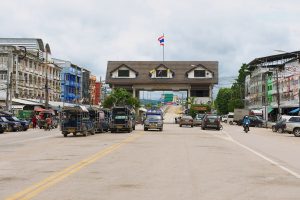A human rights group is calling on Thailand to investigate three soldiers for their roles in the killing of a Myanmar migrant on the border earlier this year, as it released a report claiming that they had tortured and beaten the man.
Aung Ko Ko, a resident of Baan Tai village in Tak Province close to the border with Myanmar, died after three soldiers and a Myanmar national brought him to an abandoned military bunker where they “severely tortured him,” Fortify Rights said in the report.
The Fortify Rights report, which it said was based on interviews with several eyewitnesses in addition to official documents including his autopsy, claims that four Thai soldiers detained the 37-year-old on January 12 of this year near a small wooden bridge in Mae Sot District, a region of Tak that has long been a concentration of Myanmar exiles and refugees. Three of them subsequently took Aung Ko Ko to a disused military bunker where they beat him “severely,” including with a long wooden implement. Several hours later, after an attempt to carry him to the nearby Myanmar border, Aung Ko Ko died from his injuries.
“The Thai government should conduct a thorough, prompt, and impartial investigation into the involvement of Thai Army soldiers in the torture and killing of Aung Ko Ko and ensure that all perpetrators are brought to justice,” the rights group said in a news release accompanying the report’s release.
The rights group cited eyewitnesses as saying that the soldiers initially detained and questioned Aung Ko Ko because he was a Myanmar national wearing the black vest of the Chor Ror Bor, a community-based security force trained by the Thai authorities.
The report doesn’t say exactly when Aung Ko Ko came to Thailand, but the fact that he had previously served on the Chor Ror Bor in Baan Tai village suggests he had been in the country for some time.
The report also highlighted the problems with the subsequent Thai police investigation into Aung Ko Ko’s death, which led to the arrest and conviction of a 24-year-old Myanmar national, Sirachuch, who witnessed Aung Ko Ko’s torture. Sirachuch, a member of the Baan Tai village Chor Ror Bor, was arrested on February 6. In September, the Mae Sot Provincial Court found him guilty of being an accomplice to manslaughter and sentenced him to three years and four months in prison.
While the police did carry out an investigation of the murder, no member of the Thai military has been arrested or charged with Aung Ko Ko’s killing, even though the police charge sheet against Sirachuch “implicates the Thai Army.” The remand application also refers to “others who remain at large.”
In its coverage of the Fortify Rights report, Reuters quoted Mae Sot’s police chief as saying that Sirachuch had not identified his accomplices. But it is plausible that as a Myanmar national he simply refused to do so for fear of backlash from the military. According to eyewitnesses interviewed by Fortify Rights, threats made by the Thai soldiers while they were beating Aung Ko Ko seemed to hint that his status as a foreigner made him disposable. “Today is the last day for you here,” one soldier told him, adding that if they saw him in Thailand again, “it’s going to be a certain death.”
While Aung Ko Ko’s death may appear an isolated case, it is part of a longer pattern of abuse and impunity within the Royal Thai Army, which according to its critics, has long shielded soldiers and their superiors from prosecution for violent transgressions. This includes the killing of suspects during questioning and the arbitrary arrest, detention, and extortion of Myanmar refugees. It also extends to the army’s treatment of its own young draftees, who are subject to brutal hazing rituals and harsh punishments that have left a not inconsiderable number dead.
Not all of these cases have gone unpunished. Military officers, including a lieutenant general, were among the more than 100 perpetrators convicted in July 2017 for their involvement in a criminal network that trafficked Rohingya Muslims fleeing persecution in Myanmar and held them for ransom in jungle camps before allowing them to enter Malaysia. The investigation followed the discovery of 36 bodies in shallow graves in southern Thailand in 2015.
However, such outcomes are far from the rule in Thailand, especially with cases that generate less public attention. In this respect, it is darkly fitting that the Fortify Rights report comes less than a month after high-ranking officials succeeded in evading any accountability for the Tak Bai massacre, a 2004 incident in southern Thailand in which the Thai army killed 84 people, 78 of them from suffocation after they were stacked on top of each other in army trucks.
In August, the Narathiwat Provincial Court finally approved a case against eight high-ranking officials in connection with the massacre, just two months before the 20-year statute of limitations was due to expire. This deadline passed on October 25 without a single defendant presenting themselves in court.

































